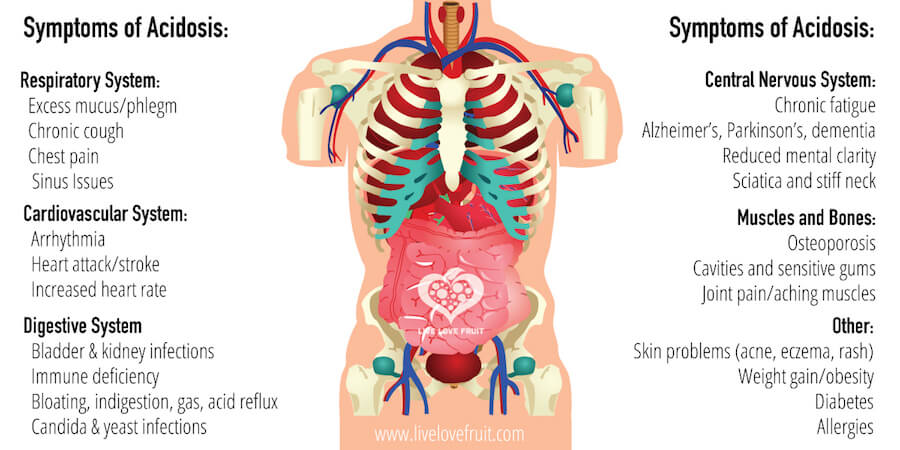Every organ in the body is affected by level of acidity. Our lungs, bones, brain, heart, liver, kidneys, stomach, intestines and skin. Bottom line– if your body is too acidic, then you’re not going to be feeling that fantastic.
When our bodies go into a state of acidosis, it becomes the best breeding place where illness and disease can easily manifest. A body that preserves its alkaline set-point will have less persistent inflammation– one of the top triggers of pretty much any illness.
After a lifetime of consuming a Basic American Diet plan (SAD), the body stays in a constant state of level of acidity. When the body remains in a chronic acidic state, valuable minerals are eliminated from important organs and bones to reduce the effects of the acid and remove it from the body. This is why we are seeing an up-rise in osteoporosis– your bones are literally being leached of the valuable minerals had to safeguard them (like calcium, salt, magnesium, and potassium). As soon as these mineral reserves are totally diminished, there are no more reserves to bring into play, and the body just continues to run more and more acidic– and this is when major illness (like cancer) begins to show up.

Many grains, dairy products, soy, and meats are acidic. Coffee, alcohol, highly processed foods, refined sugar, sugar replacements and GMO oils (and GMO food entirely) are likewise extremely acidic. When we consume (anything for that matter), acidic waste products are produced from the metabolism of these foods. These waste items must be reduced the effects of or excreted– and so this is where alkaline foods been available in. They literally neutralize the acids of an unhealthy diet.
So lets get to it– here are 20 indications that your body is too acidic:
— Excess mucus/ phlegm
— Persistent Cough
— Chest Pain
— Persistent Fatigue
— Sinus Concerns
— Osteoporosis
— Neurological conditions like Alzheimer’s, Parkinson’s and dementia
— Decreased mental clarity
— Cardiovascular damage caused by acidic plaques– increased threat of cardiac arrest and stroke
— Bladder and kidney infections
— Immune shortage
— Skin issues like eczema, acne, rashes, and dermatitis of all types
— Stomach problems consisting of bloating, indigestion, acid reflex and excess gas
— Yeast and yeast infections
— Weight gain and/or obesity
— Diabetes
— Allergic reactions
— Sciatica and stiff neck
— Cavities and sensitive gums
— Joint discomfort and aching muscles
So why does not the body simply adjust it’s own pH?
Well, it does. But it does so at a rate. All the tissues and fluids of the body are alkaline, other than for the stomach. If the body ends up being too acidic, various tissues will take alkaline-forming components from other areas of the body (like gastrointestinal enzymes of the small intestine, or our bones)– then develops a less-than-optimal environment for these locations where the alkaline forming elements were taken. So despite the fact that the body can change pH on its own, it does so at a cost to other systems in the body.
So how do you precisely set about alkalizing the body?
Modification your diet plan, and customize your lifestyle a bit– your body literally depends on you to do these things to endure.
Here are some things you can do to decrease your level of acidity:
1. Drink a lot of filtered water every day (spring water is the very best). This will help flush poisonous products from the body at a faster rate.
2. Eliminate acidic foods such as those mentioned above. You do not have to eliminate all of them, however lowering them to a minimum or a couple times a week up until you can go without them entirely is a good vantage point. If you didn’t capture it, foods like soda, popcorn, dairy, pastries, alcohol, coffee, white vinegar, sweeteners, meat, wheat products, eggs, fish, soy and seafood are higher acid-forming.
3. Consume more greens– greens are extremely alkalizing. Green shakes, green juices, salads, anything!
4. Your emotion also impacts the pH of your body. Anger, fear, animosity and jealousy produce acidity of the body fluids. Taking part in meditation or yoga will help you de-stress.
5. Avoid GMO foods.
6. Up your intake of alkaline-forming foods– vegetables and fruit are the best, with 2nd best being nuts, seeds, beans and legumes.
7. Drinking lemon water can help balance acid levels, too!
Make an effort to look after yourself and your body. You’ll value your efforts, and will start to feel more energetic and lively each and every day!

